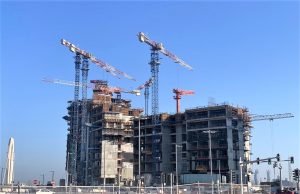Saudi Arabia issues new rules on tower cranes after Mecca collapse
Contractors urged to take more stringent protective measures before operating cranes

Saudi authorities have announced new regulations for operating tower cranes after the deadly collapse that killed over 100 people at Mecca’s Grand Mosque in September, local media reported.
Construction firms using tower cranes must get ground soil tested from a specialised laboratory before operating the heavy machinery, the Civil Defence Department (CDD) said in a statement quoted by Saudi Gazette.
The test should cover the effect of the crane’s movement on soil as well as the aerodynamic effect at times of strong winds, the CDD said.
The regulatory body has urged contractors to take protective measures before operating tower cranes, such as checking electric cables attached to the crane and making sure no partial damage has occurred during operation. The operating area should be visible, leaving enough space for the movement of the crane while loading and unloading heavy construction material.
Moreover, contractors should also check the wind speed, and only operate cranes when wind speeds are safe, the CDD said.
“If inspectors find anything wrong during tests, they should stop the crane’s operation completely for maintenance works. Operators should inform maintenance engineers if they hear any unusual or strange sound from the equipment.”
TOPIC: Mecca Crane Collapse
READ MORE: Mecca crane collapse – Lessons from the tragedy
READ MORE: Saudi Binladin makes insurance claim after crane disaster
READ MORE: Crane collapse – Saudi Binladin Group barred from new projects
READ MORE: Mecca crane ‘could not withstand intense winds’
Manufacturer Liebherr said after the September tragedy in Mecca that the LR 11350 crawler crane at the mosque could not withstand the adverse weather conditions at the time of the incident.
“During a strong thunderstorm and sandstorm with measured wind speeds of 80km/h and 105km/h, heavy rain falls and a sudden drop in temperature by 20 degrees C, the crawler crane was caught by the wind and tilted over the last support rollers of its crawler tracks,” Liebherr said.
Given the high wind speed, the boom should have been lowered to the ground to prevent it from tilting, in compliance with operating instructions, the manufacturer noted, pointing out that the crane was “technically faultless.”
After the deadly collapse, Saudi Arabia’s King Salman ordered the project contractor, Saudi Binladin Group, to ensure the safety of all the other cranes at the site. Executives at the construction giant were issued a travel ban and the group was barred from taking on new projects during the course of the investigation. The incident has prompted many to call for more stringent safety standards in the kingdom.
TOPIC: Mecca Crane Collapse
READ MORE: Mecca crane collapse – Lessons from the tragedy
READ MORE: Saudi Binladin makes insurance claim after crane disaster
READ MORE: Crane collapse – Saudi Binladin Group barred from new projects
READ MORE: Mecca crane ‘could not withstand intense winds’




